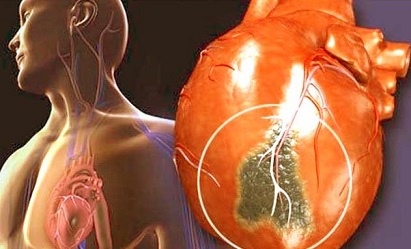SARS-CoV-2 spike protein induces the formation of senescent cells, particularly in heart tissues
Nikhil Prasad Fact checked by:Thailand Medical News Team Aug 08, 2024 8 months, 1 week, 1 day, 2 hours, 38 minutes ago
Medical News: Recent research has uncovered a critical link between the SARS-CoV-2 spike protein and exacerbated heart failure, providing new insights into the lingering effects of COVID-19, commonly known as long COVID. This
Medical News report delves into the study's findings and their implications for understanding and treating heart conditions aggravated by the virus.
 SARS-CoV-2 spike protein induces the formation of senescent cells,
SARS-CoV-2 spike protein induces the formation of senescent cells,
particularly in heart tissues
The Study and Its Institutions
The research was conducted by a team from multiple prestigious institutions in China including the Beijing Institute of Biotechnology, Zhejiang University, Tsinghua University, the Chinese PLA General Hospital, Beijing Yaogen Biotechnology Co., Ltd, Beijing Anzhen Hospital, and Fuwai Hospital among others.
Key Findings: SARS-CoV-2 Spike Protein and Cellular Senescence
The study revealed that the SARS-CoV-2 spike protein (SARS-2-S) induces the formation of senescent cells, particularly in heart tissues. Senescence is a state where cells stop dividing but do not die, leading to chronic inflammation and tissue damage. The researchers found that this process is mediated by the spike protein even in the absence of viral infection.
The study findings elaborates that the spike protein can form syncytia, which are clusters of cells that merge to become one large cell. These syncytia exhibit characteristics of senescence, including increased levels of senescence-associated β-galactosidase (SA-β-gal) and pro-inflammatory cytokines like TNFα.
How Syncytia Formation Leads to Heart Failure
Syncytia formation was observed in cells expressing the spike protein delivered via DNA plasmid or lipid nanoparticles (LNP-mRNA). Notably, this did not occur with the spike proteins produced by currently approved COVID-19 mRNA vaccines, which have been designed to prevent such fusion.
Mechanistically, the study found that the spike protein triggers the formation of MAVS aggregates, which are involved in the cellular response to viral RNA. These aggregates, in turn, activate the TNFα-TNFR2 pathway, leading to cell senescence. This pathway's activation was linked to impaired cardiac metabolism and the progression of heart failure in pre-existing heart failure conditions.
Detailed Insights: Molecular and Cellular Mechanisms
-MAVS Aggregates and TNFα Pathway: The study demonstrated that MAVS aggregates play a crucial role in regulating the fate of spike protein-induced syncytia through the TNFα-TNFR2 axis. Silencing MAVS or RIG-I significantly reduced the activation of NF-κB, IRF3, and TNFα, indicating the importance of these molecules in the process.
-Syncytia and Senescence Markers: The researchers used various techniques to show that spike protein-induced sy
ncytia exhibit senescence-like phenotypes. These include increased SA-β-gal staining, transcriptional upregulation of senescence-associated genes, and elevated levels of pro-inflammatory cytokines.
-Impact on Cardiac Metabolism: Senescent syncytia were found to have impaired mitochondrial function, leading to decreased ATP production and altered glucose metabolism. This metabolic dysfunction was reversible with WNK1 inhibition, highlighting the therapeutic potential of targeting this pathway.
Implications for Long COVID
The persistence of the spike protein or extracellular vesicles containing the spike protein (S-EVs) in post-acute sequelae of COVID-19 (PASC) patients suggests that the formation of senescent syncytia could be a contributing factor to long COVID symptoms. The study's findings underscore the need for ongoing monitoring and potential therapeutic interventions for individuals with a history of COVID-19, especially those with pre-existing heart conditions.
Protective Measures: Potential Treatments
The researchers identified several potential treatments to counteract the adverse effects of the spike protein-induced syncytia. In pre-existing heart failure models, the use of the WNK1 inhibitor WNK463, the anti-syncytial drug niclosamide, and the senolytic agent dasatinib showed promising results in protecting the heart from exacerbated failure.
Conclusion: A Path Forward
The study concludes that the spike protein's ability to induce cellular senescence and exacerbate heart failure highlights the importance of considering senescence-targeting therapies for treating COVID-19 and its long-term effects. As research progresses, these findings could pave the way for new strategies to mitigate the cardiovascular complications associated with the virus.
The study findings were published in the peer-reviewed journal: PLOS Pathogens.
https://journals.plos.org/plospathogens/article?id=10.1371/journal.ppat.1012291
For the latest on COVID-19 and heart issues, keep on logging to Thailand
Medical News.
Read Also:
https://www.thailandmedical.news/news/breaking-covid-19-news-sars-cov-2-causes-macular-degeneration-by-promoting-rpe-cell-senescence-via-the-ros-p53-p21-pathway
https://www.thailandmedical.news/news/breaking-covid-19-news-study-finds-that-omicron-variants-have-a-unique-ability-to-induce-cellular-senescence
